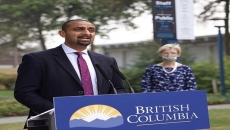Requiring proof of vaccination against COVID-19 could be the next point of contention between Canada and the United States.
A new online Léger poll suggests a deep divide among both Canadians and Americans when it comes to the idea of vaccine "passports."
The poll was conducted last month for the Association for Canadian Studies and the Canadian Institute for Health Research at the University of Manitoba.
It found 52 per cent of Canadian respondents supported showing proof of vaccination, compared with 43 per cent of Americans.
Among U.S. respondents, 36 per cent opposed the idea, compared with 33 per cent of Canadians surveyed.
Online surveys cannot be assigned a margin of error because they do not randomly sample the population.
The White House said Tuesday it won't impose a federal requirement, while Prime Minister Justin Trudeau has signalled willingness to consider it.
"We will continue to work with our partners in the United States and internationally to ensure that this is done properly," Trudeau said Tuesday about how best to reopen the Canada-U.S. border.
"We have already seen the importance of proof of vaccination for international travel ... in a pre-pandemic period in recent years. It will surely be important, but the details of what we are going to do about it, we are still fine-tuning."
White House press secretary Jen Psaki was unequivocal when she ruled the idea out Tuesday — an indication that requiring proof of vaccination would be a tough sell in a country that prizes individual liberties.
"The government is not now, nor will we be, supporting a system that requires Americans to carry a credential," Psaki said.
The priority for the White House will be to protect the "privacy and rights" of U.S. residents "so that these systems are not used against people unfairly," she said.
"There will be no federal vaccinations database and no federal mandate requiring everyone to obtain a single vaccination credential."






